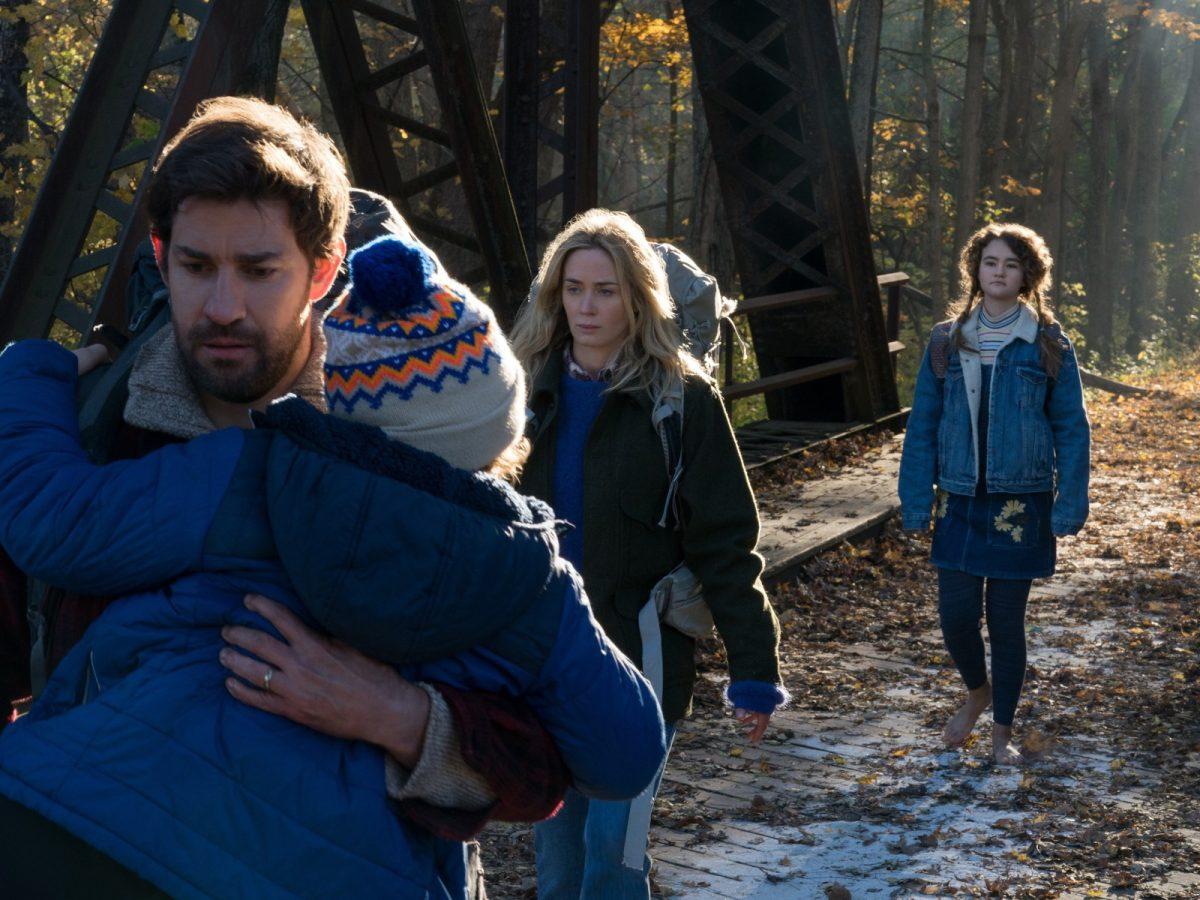In 2020, the world goes to hell. Or at least, it does in “A Quiet Place,” thanks to the sudden arrival of super-predators that are practically indestructible and blind, hunting through sound alone. It is in this post-apocalyptic hellscape that survivors Lee and Evelyn Abbott (real-life married pair John Krasinski and Emily Blunt) attempt to raise their family –– or, perhaps more accurately, keep their kids alive. This is easier said than done because, as anyone who has ever been on an airplane knows, children are very loud creatures. “A Quiet Place” reminds viewers of this incompatibility early on, killing Beau (Cade Woodward), the Abbotts’ youngest child, approximately 10 minutes into the film. He picks up a rocket toy on a supply run that, being a modern toy, lights up and makes obnoxious noises at the press of a button — which Beau then presses, because, you know, duh. And you can guess what happens next.
After this tone-setting prologue, the film then jumps ahead nearly a year. The Abbotts have something of a system set up on their isolated farm, which seems about as close to idyllic country life as the apocalypse allows. Dad hunts and scavenges and spends his evenings sending out distress signals in his inexplicably advanced basement tech-cave, only to be consistently met with radio silence. Mom cooks and does laundry and homeschools the two remaining children, Regan (Millicent Simmonds) and Marcus (Noah Jupe). As Regan is deaf, the Abbotts came into this new, terrifyingly quiet world with the decided advantage of being familiar with American Sign Language. Why then, especially given these circumstances and the constant threat of giant sound-hunting monsters, all of the actors beyond Simmonds, who is deaf in real life, spend the entire film whisper-signing, I have no idea. No, scratch that, I have an idea — it’s so that the film doesn’t have to make people read subtitles, because Americans hate having to read at the movies (that’s just the stereotype, don’t shoot the messenger). But within the world of the movie, it makes absolutely no sense at all. Anyway, moving on.
In addition to setting the tone, the early death of little Beau sets up most of the film’s interpersonal and intrapersonal conflicts. Evelyn feels responsible because she feels like she should have carried him home, and if she had, the tragedy would never have happened. Regan also feels responsible because she returned the toy to Beau after their father originally confiscated it, not realizing that it made noise. She feels like her father blames her, too — and to be fair, it really sort of feels like he does. Guilt, like household roles, is a gendered thing in “A Quiet Place.”
And, to top it all off, Evelyn is pregnant with baby number four. I can totally buy that the apocalypse would make getting consistent access to reliable birth control something of a problem. However, the way the film treats the situation, and given the whole “Brief Life of Beau” prologue, the impending arrival seems like less of a “life happens” scenario and more of an intentional replacement baby kind of deal.
But, of course, the Abbotts have an ingenious plan for dealing with the new addition, just like they have systems for avoiding the usual noisiness of everyday life. For example, dinner is a cutlery and dishware-free zone, and board games are played with noise-free replacement crocheted pieces. This time, it involves a (hopefully) sound-proofed bunker and, for added assurance, a padded, airtight cradle with a lid accompanied by an oxygen tank hooked up to an infant-sized gas mask.
What happens when the baby moves past the newborn stage? Are the Abbotts planning to risk becoming monster food on the daily, or do they intend to have the baby grow into an anemic vampire child with atrophied muscles? Of course, the whole situation goes sideways well before they ever get to that bridge, because, as you already know, it’s a horror movie.
“A Quiet Place” is an okay film. A case could even be made that it’s a good film. It’s atmospheric, generally succeeds in crafting characters you can at least somewhat sympathize with and care for, and Emily Blunt is marvelous, as usual. But there are so many better things out there, and the premise, in spite of all the lauding it has received, isn’t actually all that extraordinary. “If they hear you, they hunt you” — when has sound and the importance of being (not) heard not been a staple of cinematic horror?
If you want great silent horror, go watch “Nosferatu.” Or, if you want to watch the best film ever made about a father building a bunker to protect his family, featuring the winning combination of oxygen tanks and kid-sized gas masks with an Americana grunge vibe, go borrow “Take Shelter” from Clapp Library. You can use the money you would have spent on a movie ticket and transportation to order take out. Or pay for one quarter of a textbook. Regardless, this is one instance where you really shouldn’t believe the hype.






